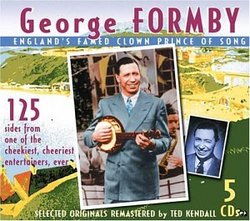| All Artists: George Formby Title: England's Famed Clown Prince of Song Members Wishing: 0 Total Copies: 0 Label: Jsp Records Release Date: 4/26/2004 Album Type: Box set Genres: International Music, Special Interest, Pop, Broadway & Vocalists Styles: Europe, Britain & Ireland, Comedy & Spoken Word, Nostalgia, Easy Listening, Oldies, Vocal Pop, Traditional Vocal Pop Number of Discs: 5 SwapaCD Credits: 5 UPCs: 788065190125, 669910198353 |
Search - George Formby :: England's Famed Clown Prince of Song
 | George Formby England's Famed Clown Prince of Song Genres: International Music, Special Interest, Pop, Broadway & Vocalists
|
Larger Image |
CD Details |
CD ReviewsComplete collection of his pre-war music Peter Durward Harris | Leicester England | 03/30/2009 (5 out of 5 stars) "George's father was born James Booth but became one of England's most successful music hall performers using the stage name George Formby; he died in 1921. George junior, who had been raised as George Hoy, eventually took over his father's stage name and perfected his craft on the northern club circuit. He made his first recordings in 1926. All six songs were part of his father's repertoire and it seems that George sounded exactly like his father. At the time this was not appreciated, but they now serve as a historical document in the absence (it seems) of any original recordings by George's father. George junior's own style only began to emerge in 1932 with Chinese laundry blues, track 11 of the first CD here.
Chinese laundry blues, apart from showing the public that George had finally broken away from his father's style, introduced that same public to Mr Wu, who featured in several more of George's songs through the years including The wedding of Mr Wu and I`m the husband of the wife of Mr Wu, both featured in this boxed set. More songs about Mr Wu can be found in the second boxed set covering George's later recordings. Another early success for George was With my little ukulele in my hand. It aroused much controversy and the BBC banned it, which boosted its popularity further. The BBC never learner the lesson that the publicity generated by their banning a record because of obscene or otherwise offensive content only serves to increase its popularity. They banned several of George's records and, following the impact of the first ban, he was always happy to hear of another record of his being banned. Perhaps the most famous of his records to receive a ban was When I'm cleaning windows. As a contrast, Leaning on a lamp post (revived by Herman's Hermits in the sixties) represented a departure from George's usual repertoire, but demonstrates his versatility. On the fourth CD, there's a track titled Remember me, on which George does not sing. Tommy Farr is the singer here, but George supplies a spoken introduction and also plays ukulele (briefly) during the track. It barely qualifies as a George Formby track, but a footnote beneath the track listing says that he is not audible on the track, although some discographers insist that he is. We are then invited to judge for ourselves. Well, I judged and I heard him on that track - but the following track, Maybe I'll find somebody else, also features Tommy Farr singing. I don't hear George or his ukulele on that track. After those two tracks, normal service is resumed. This boxed set doesn't have a comprehensive booklet, but a little booklet with each CD. Between them, they tell us about George (up to 1939), his wife Beryl (who seems to have been a battleaxe), the women who co-starred in his films, his father and the music hall tradition. As for the sound quality, it is re-mastered from the best source of George Formby material, so it's unlikely that you'll hear George's music sounding better than it does here. We must remember that these tracks were originally laid down between 1926 and 1939, when technology was very primitive, even compared to the fifties and sixties, let alone what is available now. If you're looking for a greatest hits collection, this obviously isn't it, since some of those (including Auntie Maggie's remedy) came later in his career. However, this collection and the companion volume DO contain all the hits between them, along with nearly everything else that George recorded in his career. Are any of the omissions worth worrying about? Probably not." |

 Track Listings (23) - Disc #1
Track Listings (23) - Disc #1